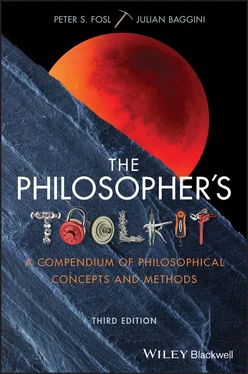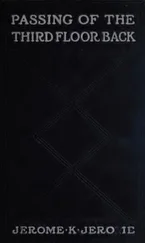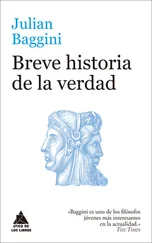Another type of axiom is also true by definition, but in a slightly more interesting way. Many regions of mathematics and geometry rest on their axioms, and it’s only by accepting these basic axioms that more complex proofs can be constructed within those regions. You might call these propositions ‘primitive’ sentences within the system (7.7). For example, it is an axiom of Euclidean geometry that the shortest distance between any two points is a straight line. But while axioms like these are vital in geometry and mathematics, they merely stipulate what is true within the particular system of geometry or mathematics to which they belong. Their truth is guaranteed, but only in a limited way – that is, only within the context in which they’re defined. Used in this way, axioms’ acceptability rises or falls with the acceptability of the theoretical system as a whole.
So, some axioms aren’t terribly informative, while others are limited to specific contexts. Some may find this account rather unsatisfactory and object to it. Aren’t there any ‘universal axioms’ that are both secure and informative in all contexts universally, for all thinkers, no matter what? Some philosophers have thought so.
The Dutch philosopher Baruch (also known as Benedictus) Spinoza (1632–77) in his Ethics (1677) attempted to construct an entire metaphysical system from just a few axioms, axioms that he believed to be universal truths virtually identical with God’s thoughts. The problem is that most would agree that at least some of his axioms seem to be empty, unjustifiable, and parochial assumptions. For example, one of Spinoza’s axioms states that ‘if there be no determinate cause it is impossible that an effect should follow’ ( Ethics , Bk 1, Pt 1, axiom 3).
As English empiricist John Locke (1632–1704) argues, however, this claim, taken literally, is pretty uninformative, since it’s true by definition that all effects have causes. What the axiom seems to imply, however, is a more metaphysical claim – that all events in the world are effects that necessarily follow from their causes. Working in Locke’s wake, David Hume (1711–76) points out that the metaphysical claim fares no better. Not only do we have no reason to think it’s true, but moreover it’s not at all senseless to hold that an event might occur without any cause at all ( Treatise , 1.3.14). Medieval Islamic philosopher al‐Ghazali (1058–1111) advanced a similar line in his The Incoherence of the Philosophers (‘On natural science’, Question 1ff.).
Of course, Spinoza seems to claim that he has grasped the truth of his axioms through a special form of intuition ( scientia intuitiva ), and many philosophers have held that there are ‘basic’ and ‘self‐evident’ truths that may serve as axioms in our reasoning. (See 7.1.) But why should we believe them?
In many contexts of rationality, therefore, axioms seem to be a useful device, and axiomatic systems of rationality often serve us very well, indeed – especially as part of mathematics and logical theory. But the notion that those axioms can be so secure that no rational person could in any context deny them seems to be rather dubious.
1 3.6 Circularity
2 4.6 Cause/reason
3 7.1 Basic beliefs
4 7.8 Self‐evident truths
Euclid (c. 300 BCE). Elements
* Alfred Tarski (1946/95). Introduction to Logic and to the Methodology of Deductive Sciences
A.A. Fraenkel, Y. Bar‐Hillel, and A. Levy (1973). Foundations of Set Theory
Fred R. Berger (1977). Studying Deductive Logic
If, somewhere, there lie written on tablets of stone the ten philosophical commandments, you can be sure that numbered among them is the injunction to ‘define your terms’. In fact, definitions are so important in philosophy that some have maintained that definitions are ultimately all there is to the subject.
Definitions are important because without them, it’s very easy to argue at cross‐purposes or to commit fallacies involving equivocation (3.3). As the experience of attorneys who questioned former US president Bill Clinton show, if you are, for example, to interrogate someone about extramarital sex, you need to define what precisely you mean by ‘sex’. Otherwise, much argument down the line, you can bet someone will turn around and say, ‘Oh, well, I wasn’t counting that as sex’. Much of our language is vague and ambiguous, but if we are to discuss matters in as precise a way as possible, as philosophy aims to do, we should remove as much vagueness and ambiguity as possible, and adequate definitions are the perfect tool for helping us do that.
For example, consider the justice of ‘free trade’. In doing so, you may define free trade as ‘commercial exchange that is not hindered by national or international law’. But note that with this rendering you have fixed the definition of free trade for the purposes of your discussion. Others may argue that they have better or alternative definitions of free trade. This may lead them to reach different conclusions about its justice. You might respond by adopting a new definition, defending your original definition, or proposing yet another definition. And so it goes. That’s why setting out definitions for difficult concepts and reflecting on their implications composes a great deal of philosophical work.
Again, the reason why it’s important to lay out clear definitions for difficult or contentious concepts is that any conclusions you reach properly apply only to those concepts (e.g. ‘free trade’) as defined . A clear definition of how you will use the term thereby both helps and constrains discussion. It helps discussion because it gives a determinate and non‐ambiguous meaning to the term. It limits discussion because it means that whatever you conclude does not necessarily apply to other uses of the term. As it turns out, much disagreement in life results from the disagreeing parties, without their realising it, meaning different things by their terms.
That’s why it’s important to find a definition that does the right kind of work. If one’s definition is too narrow or idiosyncratic, it may be that one’s findings cannot be applied as broadly as could be hoped. For example, if one defines ‘man’ to mean bearded, human, male adult, one may reach some rather absurd conclusions – for example, that many Native American males are not men. A tool for criticism results from understanding this problem. In order to show that a philosophical position’s use of terms is inadequate because too narrow , point to a case that ought to be covered by the definitions it uses but clearly isn’t.
If, on the other hand, a definition is too broad , it may lead to equally erroneous or misleading conclusions. For example, if you define wrongdoing as ‘inflicting suffering or pain upon another person’ you would have to count the administering of shots by physicians, the punishment of children and criminals, and the coaching of athletes as instances of wrongdoing. Another way, then, of criticising someone’s position on some philosophical topic is to indicate a case that fits the definition he or she is using but which should clearly not be included under it. Cases showing that definitions are too broad are special kinds of counterexample (3.12).
A definition is like a property line; it establishes the limits marking or defining those instances to which it’s proper to apply a term and those instances to which it is not. In this sense, a definition articulates the specific differences that distinguish one kind of thing from all others (5.2). The ideal definition, therefore, permits application of the term to just those cases to which it should apply – and to no others. It will admit no counterexamples.
Читать дальше












